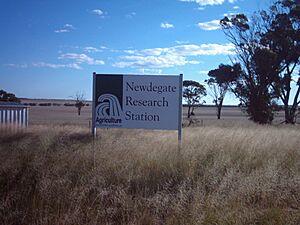Department of Primary Industries and Regional Development facts for kids
 |
|
| Agency overview | |
|---|---|
| Formed | 1894 |
| Jurisdiction | Government of Western Australia |
| Headquarters | 1 Nash Street, Perth, Western Australia |
| Employees | 1,687 (2006), 900 (2016) |
| Agency executive |
|
The Department of Primary Industries and Regional Development (DPIRD) is a special part of the Western Australian government. Its main job is to help and manage important industries like farming, food production, and fishing. It also works to make sure different parts of Western Australia grow and develop.
DPIRD was created in 2017. It brought together three older departments: the Department of Agriculture and Food, the Department of Fisheries, and the Department of Regional Development.
Different government ministers are in charge of DPIRD's work. These include the Minister for Agriculture and Food, the Minister for Regional Development, and the Minister for Fisheries.
The department has a budget to do its work. This money comes from the state government, federal grants, and fees for services.
DPIRD also helps keep Western Australia safe from pests and diseases. It manages quarantine rules for plants, soil, and animal products coming into the state. It also works to get rid of harmful pests. These include the rainbow lorikeet (Trichoglossus moluccanus), skeleton weed (Chondrilla juncea), and Portuguese millipede (Ommatoiulus moreletii).
History of DPIRD
The story of DPIRD began a long time ago. In 1894, John Forrest, who was the leader of Western Australia (the Premier), started the Bureau of Agriculture. Charles Harper was its first chairman.
At first, no government minister was directly in charge of the Bureau. This changed in 1898. The Bureau became the Agricultural Advisory Board. A new Department of Agriculture was officially created. G.L. Throssell became its first Commissioner for Crown Lands.
In 1908, Professor William Lowrie became the director. He left in 1911. Later, Sir James Mitchell was the Minister for Agriculture. He made the department bigger. He created three special commissioner roles to focus on different areas.
Names Over Time
The department has changed its name several times:
- Western Australian Bureau of Agriculture (1894 - 1898)
- Department of Agriculture (1898 - 2006)
- Department of Agriculture and Food (Western Australia) (2006 - 2017)
- Department of Primary Industries and Regional Development (2017 - present)
Research Stations
The department runs several research stations across Western Australia. These stations are places where scientists and farmers work together. They do important research to help improve farming, food production, and land management.
Some of these research stations include:
- Avondale Agricultural Research Station
- Badgingarra Research Station
- Esperance Downs Research Station
- Gascoyne Research Station - Carnarvon
- Katanning Research Station
- Kununurra: Frank Wise Research Institute
- Manjimup Research Station
- Medina Research Station
- Merredin Research Station
- Mount Barker Research Station
- Newdegate Research Station
- Vasse Research Station
- Wongan Hills Research Station
 | Charles R. Drew |
 | Benjamin Banneker |
 | Jane C. Wright |
 | Roger Arliner Young |


